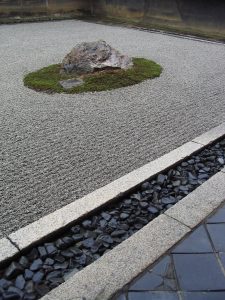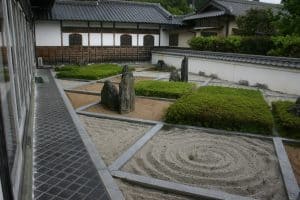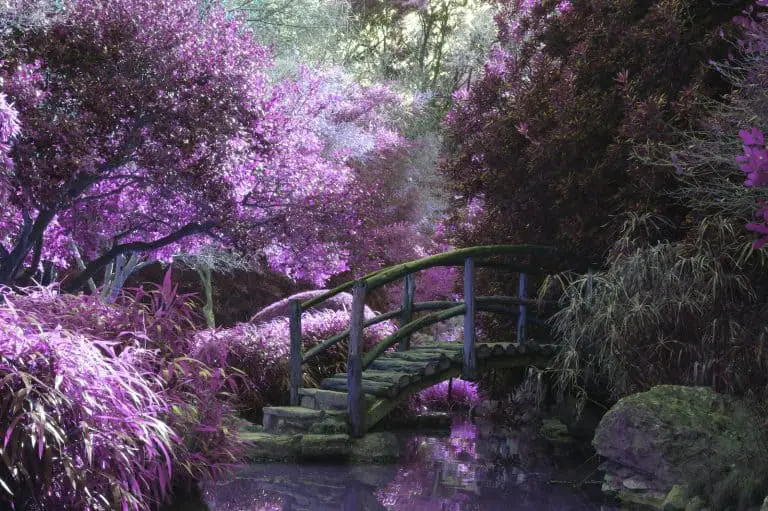In the hustle and bustle of modern life, finding peace and tranquility can seem like an elusive quest. However, by incorporating the principles of Zen gardens and Feng Shui, one can create a harmonious outdoor space that fosters relaxation and contemplation. This article explores the concept of Zen garden Feng Shui, discussing how these two ancient practices can be combined to craft a serene and calming environment.
What is a Zen Garden?

A Zen garden, also known as a Japanese rock garden or dry landscape garden, is a miniature landscape designed to mimic the essence of nature. Traditionally, Zen gardens are comprised of rocks, gravel, sand, and moss, with minimalistic plantings. These gardens are meticulously arranged to evoke a sense of tranquility, balance, and simplicity.
Understanding Feng Shui
Feng Shui, on the other hand, is an ancient Chinese practice focused on harmonizing individuals with their surroundings and maximizing positive energy flow. It is based on the belief that the layout and organization of a space can greatly impact one’s well-being and prosperity.
The Synergy of Zen Gardens and Feng Shui
When Zen garden principles are incorporated into the practice of Feng Shui, the result is a truly harmonious outdoor space that promotes tranquility and inner peace. Both Zen gardens and Feng Shui share a common goal of creating balance and harmony between individuals and their environment.
Creating a Perfect Zen Garden with Feng Shui
To craft a perfect Zen garden using Feng Shui, one must consider the various elements that contribute to its serenity and minimalistic beauty.
1. Water Feature: Incorporating a water feature, such as a small pond or a water fountain, symbolizes the flow of energy and adds a calming ambiance to the garden.
2. Rocks and Stones: By strategically placing lava rocks and stones in the garden, one can create a sense of stability and grounding. These natural elements represent mountains and bring a sense of tranquility to the space.

3. Wind Chimes: Hanging wind chimes in the garden provides a gentle and soothing sound that harmonizes with nature. This auditory experience adds another layer of tranquility to the Zen garden.
4. Plants and Trees: While Zen gardens typically have minimal plantings, carefully selected trees and plants can enhance the natural beauty of the space and provide shade and privacy.
5. Fire Element: Introducing a subtle fire element, such as a small fire pit or lantern, brings warmth and energy to the garden. It symbolizes life force and adds a touch of spirituality to the Zen garden.
6. Light and Shade: Creating a play of light and shade in the garden adds depth and dimension. This interplay highlights different forms and textures, contributing to the overall sense of tranquility.
7. Moss and Gravel: The use of moss and gravel in a Zen garden evokes a sense of simplicity and purity. These elements require minimal maintenance and infuse the garden with a serene atmosphere.
8. Balance and Symmetry: Achieving balance and symmetry in the arrangement of the garden’s elements is essential in creating a harmonious space. This principle reflects the core philosophy of both Zen gardens and Feng Shui.
The Impact of Zen Garden Feng Shui
By implementing these principles, a Zen garden crafted with Feng Shui can serve as a haven for relaxation and contemplation. It becomes a space where one can escape the chaos of everyday life and reconnect with nature and oneself. The simplicity of the garden’s design and its focus on natural elements make it a perfect retreat for finding peace and tranquility.
Final Thoughts
Zen garden Feng Shui is a fusion of ancient practices that create a serene and contemplative outdoor space. By incorporating the principles of Zen gardens and Feng Shui, individuals can craft a perfect Zen garden that promotes tranquility, balance, and inner peace. The harmonious synergy between nature, elements, and minimalist design fosters a sense of serenity and calm, providing a refuge from the chaos of the modern world. So, whether it’s a desktop Zen garden or a sprawling backyard oasis, embracing Zen garden Feng Shui can transform any outdoor area into a sanctuary of natural beauty and tranquility.

